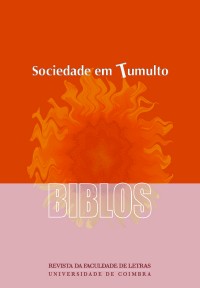Please use this identifier to cite or link to this item:
https://hdl.handle.net/10316.2/32764| Title: | Diana de Lis: um olhar feminino sobre a cultura literária portuguesa dos anos ’20 | Authors: | Ferro, Manuel | Keywords: | Portuguese literature of the twenties;women studies;Literatura portuguesa do séc. XX;questões feministas | Issue Date: | 2009 | Publisher: | Faculdade de Letras da Universidade de Coimbra | Abstract: | Diana de Lis, ao tentar explorar as novas potencialidades no campo da
Literatura Portuguesa, na perspectiva dos géneros e formas literárias, apresenta
um olhar ao mesmo tempo crítico, irónico e, por vezes, sarcástico, acerca da
mulher, da sua psicologia e da sociedade da época — os loucos ‘anos 20’. Por
outro lado, a sua intenção de denunciar a futilidade do comportamento geral
da época está ligada à compreensão e ternura, que constituem o traço principal
da sensibilidade feminina, capaz de ver em qualquer situação humana
motivo
de reflexão. Eis talvez a razão por que praticamente todos os seus textos têm
em vista a expectativa do público leitor: das revistas e jornais em que são
publicados, ou seja, um público leitor sobretudo feminino, oriundo das classes
altas, e necessariamente ocioso. E se o nome de Diana de Lis, hoje em dia, é
praticamente apenas mencionado em ambientes muito restritos, este facto só se
justifica porque a obra desta escritora não foi além de uma fase experimental.
A morte levou-a muito cedo, demasiado jovem, antes de poder realizar os seus
grandes sonhos e projectos literários. In trying to explore new potentialities in literary genres and forms in the field of Portuguese literature, Diana de Lis presents a simultaneously critical, ironical, and sometimes even sarcastic, view of woman, her psychology and the society of her times the ‘crazy’ 1920s. Nevertheless, her intention of denouncing the futility of the period’s general behaviour is conveyed with understanding and tenderness, which constitute the main features of woman’s sensibility, capable of seeing in every human case a motive for reflection. This may be the reason why most of her texts have in mind her audience’s expectations: primarily upper-class women, who had leisure to read the magazines and newspapers in which she was published. If today the name of Diana de Lis is mentioned almost exclusively in very restricted circles, this is due to the fact that her work did not develop beyond an experimental phase. She died too early, while still quite young, before she could fulfill her great literary dreams and projects. |
URI: | https://hdl.handle.net/10316.2/32764 | ISSN: | 0870-4112 | DOI: | 10.14195/0870-4112_7_17 |
| Appears in Collections: | Biblos |
Files in This Item:
| File | Description | Size | Format | |
|---|---|---|---|---|
| biblosvii_artigo17.pdf | 520.76 kB | Adobe PDF |  |
Items in DSpace are protected by copyright, with all rights reserved, unless otherwise indicated.
